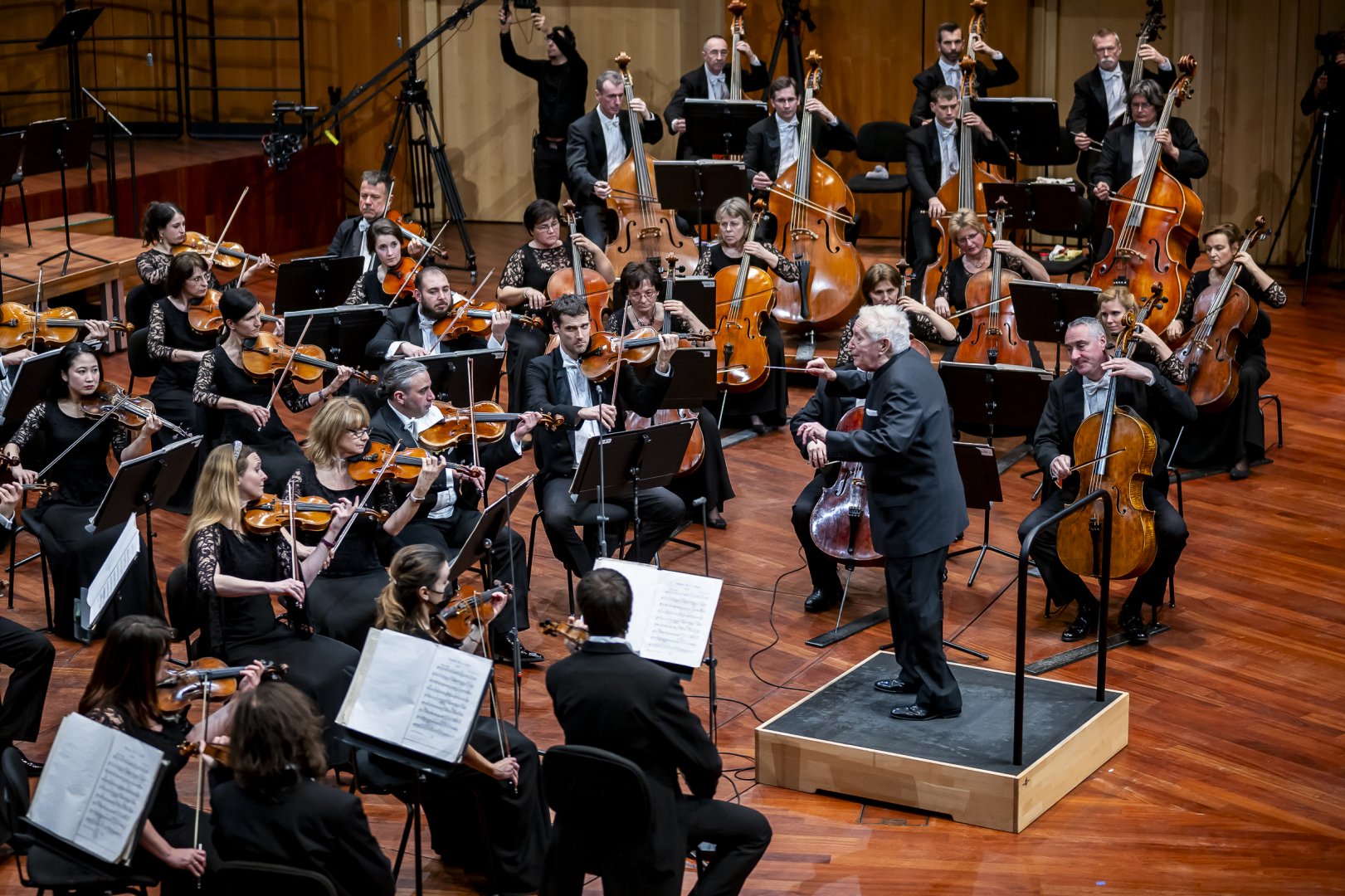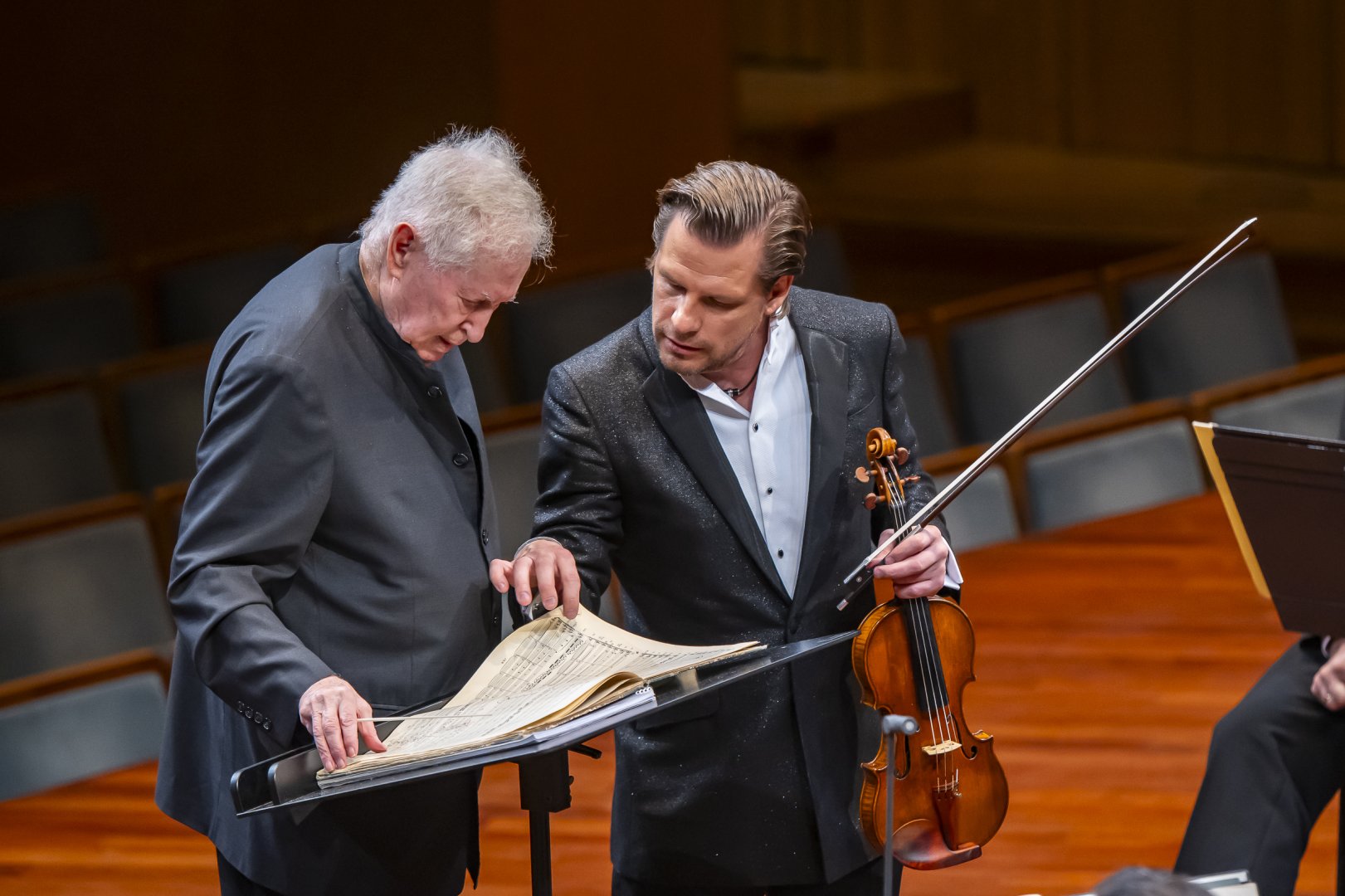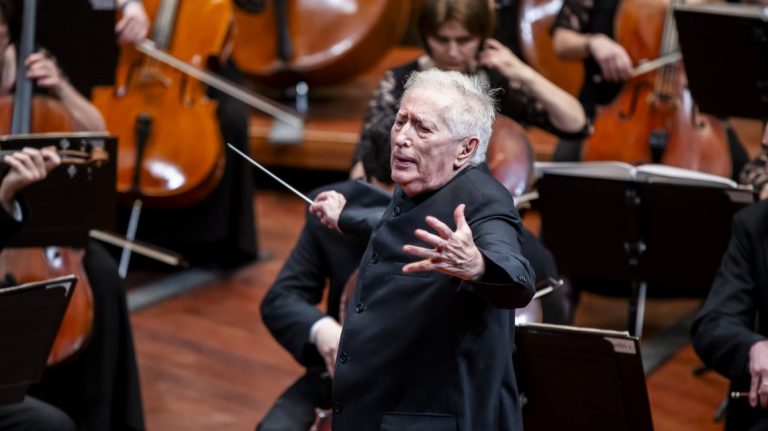In mid-February, a German conductor of Russian origin, Thomas Sanderling performed a Brahms concert. While in Budapest, I had the opportunity to interview the renowned conductor about his experiences in Hungary, his thoughts on Shostakovich, and his perspective on what it takes to be a good conductor.
– Your father is the legendary Kurt Sanderling, after whom your two half-brothers became conductors. Was it clear from the start that this would be your vocation as well?
– Music defined my childhood. I was 1+ when my family returned to Leingrad. At the age of six I passed the exams to enter the Children’s College of the Leningrad Conservatoire. My first instrument was the violin and later the piano. So I started out as an instrumentalist, but I saw and heard many orchestral concerts and became more and more convinced that I wanted to be a conductor.
– You were born in Novosibirsk, Siberia, at the end of 1942. Even before the war, ensembles from institutions such as the Leningrad Philharmonic Orchestra, the Pushkin Theatre and the collection of the Tretyakov Gallery had been evacuated to that city. Do you remember anything from those days?
– I was not even 2 years old when my parents moved to St Petersburg. My first memories are of this city, or Leningrad as it was then.
– You were in close contact with artists such as Yevgeny Mravinsky, later Bernstein and Karajan, and Dmitri Shostakovich during your lifetime. How did they influence your professional life?
– When I started studying music, Yevgeny Mravinsky was the music director of the Leningrad Philharmonic. I watched many of his rehearsals and concerts. He was actually my first mentor, along with my father, and after our family moved to Berlin, I had the privilege of working as an assistant to Bernstein and Karajan. I must also mention Hans Swarowsky and Sergiu Celibidache, with whom I had the opportunity to consult several times. They were all very different personalities from whom I could learn a lot, but there was one person who embodied genius for me and really defined my path: Dmitri Shostakovich.

– What made him special?
– When I say genius, I can’t really explain the meaning of the word, but maybe I don’t have to. Apart from the fact that I was able to learn from him every single element and driving force of his own music, he was also an outstanding human being who inspired awe by his very presence. If anyone, he is truly one of the greatest in the history of music, alongside Bach, Mozart, Beethoven, Brahms, Mahler and Bartók.
– What is your most memorable experience with him?
– First of all, I have an image of him sitting in the building of the Leningrad Philharmonic, listening to rehearsals of his own works. Even as a child I could feel his special aura. Later, after winning a competition, I was invited by Yevgeny Svetlanov to make my concert debut in Moscow. It turned out that Shostakovich and his wife were there for the concert. First he came to see me during the interval, then at the end of the concert he congratulated me and invited me to visit them at home.
– Were you able to accept the invitation?
– I was supposed to go to Leningrad immediately after the concert because I had rehearsals there with the Philharmonic, but on my way back to Berlin I was able to postpone my departure for a day. I spent only a few hours in Moscow in Shostakovich’s company, but I can safely say that it was one of the most significant musical and human encounters of my life. He spoke and I listened. Meanwhile, I thought I should leave because I didn’t want to be a burden. At one point he got up and took some music from another room: copies of his latest works, the 13th and 14th symphonies. There were corrections written by him and some very warm words addressed to me.
The Moscow premiere in 1962 was conducted by Kirill Kondrasin, and Shostakovich suggested that I conduct the German premiere. Shortly afterwards, he surprised me with a categorical request for a text in the language of the audience: German. I had to comply with this condition and set about the enormous task of producing it. After the concerts, he commissioned me, through his son Maksim, to give the German premiere of the orchestral version of his last orchestral work: the Michelangelo Suite. Unfortunately, he was unable to attend the premiere.
– As an experienced musician, what do you think makes someone a good conductor?
– Being a good conductor is not an easy task. A less talented and prepared conductor may be stigmatized sooner than an instrumentalist with similar qualities. However, performing at a high level as a conductor is not easier than as an instrumental or vocal soloist. The most crucial aspect for a conductor is to be musical and to convince themselves and their colleagues that they are good musicians. Technique is worthless without expression and feeling. Good communication is essential, and rehearsal is important. Special abilities are required because there are no recipes. Tradition, mentality, and experience with the particular work all influence the approach.
– What advice would you give to young conductors at the beginning of their careers?
– To sum it up, becoming a conductor is the first step towards success. People like Karajan or Svetlanov believed that having an inexplicable potential was necessary, but they still had to learn. Learning and having potential go hand in hand. You can observe the greats and learn from them by watching them rehearse.
– Do you have a mission as a conductor?
– I have considered this topic extensively and have concluded that the music’s meaning must ultimately speak for itself. It is a wonderful feeling when conductors can convey the composer’s intended message with an orchestra, especially when combined with excellent performers. I could not ask for more.

– For the Brahms concert in Budapest in February, Krill Troussov and the MÁV Symphony Orchestra will be your partners. Do you visit Hungary often?
– I conducted the National Philharmonic several times when Géza Kovács was its director. Last year I was on the jury of the Fricsay Ferenc International Conducting Competition in Szeged, where I also met the director of the MÁV Symphony Orchestra. I was delighted to be invited, it is a good orchestra.
– What are you looking forward to next?
– We’re in the middle of the Bruckner year. I’ll be conducting the works of the great Austrian master in a number of concerts in Europe and Asia, and next year will be the 50th anniversary of Shostakovich’s death, for which I’m already preparing a number of national and local premieres alongside his standard repertoire.











